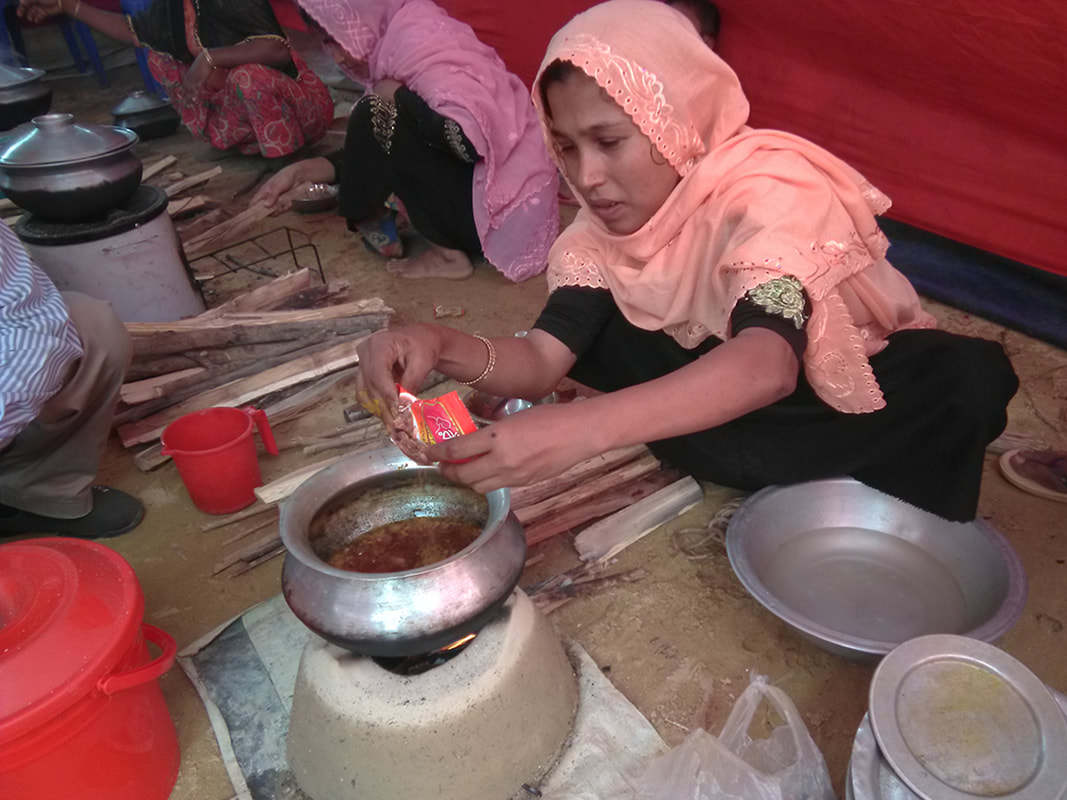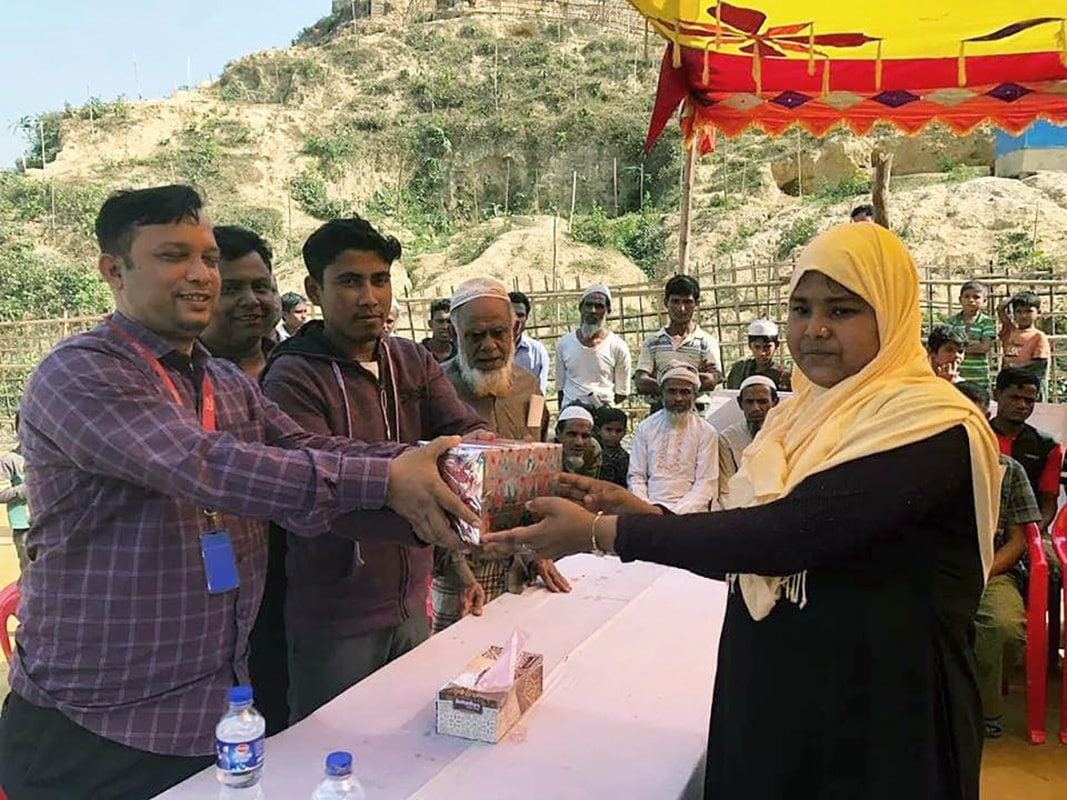|
As part of efforts to combat deforestation and improve health in refugee camps in Cox’s Bazar, Bangladesh, Community Partners International (CPI) is working with Bangladeshi organization the Village Education Resource Center (VERC) to introduce improved cookstoves into refugee households. On December 11, 2018, the VERC-CPI Energy team organized the first public cooking competition in Camp 8E in which five contestants took up the challenge to cook the best chicken curry with rice on three different cookstove models. The competition was held to showcase the advantages of improved cookstoves and promote uptake in the Rohingya refugee community. Many families in Cox’s Bazar continue to cook on traditional stoves, often just a simple fire pit or clay hearth with a wood fire. These stove designs have low thermal efficiency. They lose a lot of heat and require a substantial amount of firewood or other solid fuel to prepare a meal. Every day in Cox’s Bazar, refugees use an estimated 700 tons of firewood for cooking. With 2,000 hectares of forest and agricultural land already taken up by the camps, many thousands more hectares surrounding the camps are now being depleted of vegetation with even tree roots dug out of the ground for use as firewood. With such a large population to sustain, these resources are under enormous strain. CPI is focusing on distributing two low-cost improved cookstove models produced locally in Bangladesh – the Agni Shikha and the IDCOL - that have high fuel-efficiency and low carbon monoxide emissions. These improved cookstoves consume up to 50% less fuel than traditional stoves. Five women took part in the cooking competition, each respected in their households and communities for their cooking expertise. Two of the women were provided with Agni Shikha improved cookstoves, two with IDCOL improved cookstoves, and the fifth used a traditional cookstove. Competition judges included members of staff from CPI and VERC, and respected elders from the community. The judges were asked to assess their efforts on two key criteria to determine the winner – the length of time it took to cook the curry and rice, and the taste of the finished curries. As a crowd of more than a hundred people from the surrounding community gathered to watch, the women were handed the same raw ingredients to make chicken curry, some uncooked rice and the same amount of firewood and were asked to begin cooking. One of the contestants, Tofura, admitted to having nerves early on. “It was my first time to cook in front of lots of people,” she said. “Initially I was nervous but eventually I managed the situation.” An hour later, all five contestants had finished cooking and it was time for the judges to deliberate. After tasting each curry and checking the cooking time data, they conferred together to make their decision while the contestants and the crowd waited in suspense. After a few minutes the decision was made and the panel announced that Sanjida, using an IDCOL improved cookstove, was the winner. Sanjida had taken just 42 minutes to complete cooking both the rice and curry, and the judges agreed that her food tasted excellent. The competition was close however. The second placed contestant was Tofura who, despite her nerves, finished her cooking using an IDCOL stove in 45 minutes and also received high marks for taste from the judging panel. In third and fourth places were Noor and Samsun using Agni Shikha improved cookstoves, who finished cooking in 48 and 51 minutes respectively, followed by Anowara in fifth place who used a traditional cookstove and finished cooking in 60 minutes. All the contestants were awarded prizes to thank them for participating in the competition. “It was really enjoyable,” said the winner, Sanjida. “I was happy to see so many of my neighbors attending. Thank you to CPI and VERC for arranging this wonderful event.” Fellow contestant Anowar added, “I have no words to explain how much I enjoyed being part of it. I found this event very useful to raise awareness as well as bringing together many people from different neighborhoods to be entertained. We were very happy to receive prizes!” On January 3 and 8, 2019, CPI and VERC organized two further cooking competitions in other camp sectors, following a similar format. On those two occasions, the IDCOL improved cookstoves again produced the fastest times, with both curry and rice being cooked in as little as 25 minutes. The Agni Shikha improved cookstoves came a close second and the traditional cookstoves followed in last place.
The results from the three competitions held to date show that the improved cookstoves cook food in less time and consume less firewood than traditional cookstoves, and they produced tasty, well-cooked curries. The competitions provided an excellent opportunity for members of the community to see the improved cookstoves in action, and directly observe their advantages over traditional stoves. CPI and VERC are planning further cooking competitions in other refugee camp areas in Cox’s Bazar to help spread the word and encourage households to make the switch from traditional cookstoves. Comments are closed.
|
AuthorCPI Admin Archives
July 2024
Categories
All
|
|
|
COMMUNITY PARTNERS INTERNATIONAL
580 California St Fl 16, Ste 1658, San Francisco, CA 94104-1068, USA [email protected] +1 510 225 9676 We are a registered nonprofit 501(c)(3) Public Charity. TAX ID 94-3375666 |
©
Community Partners International



 RSS Feed
RSS Feed
